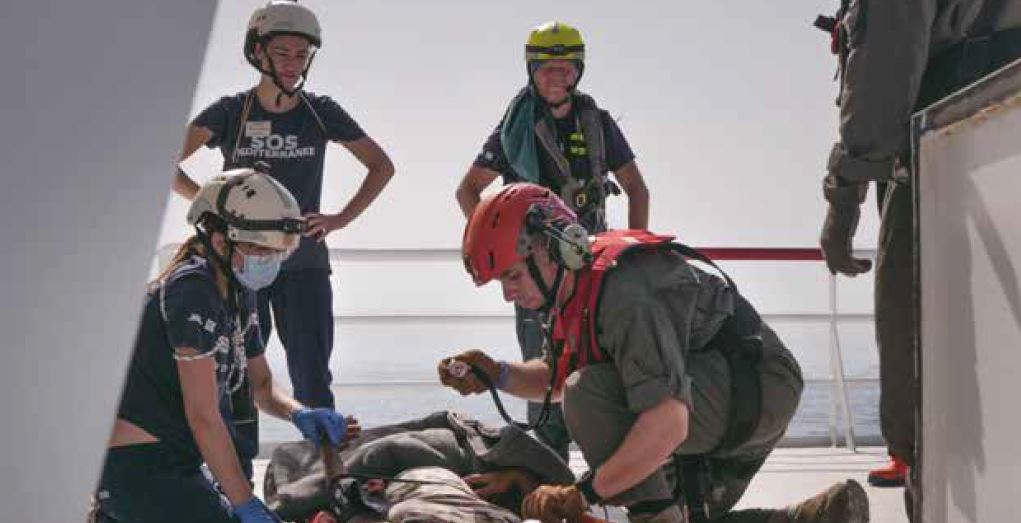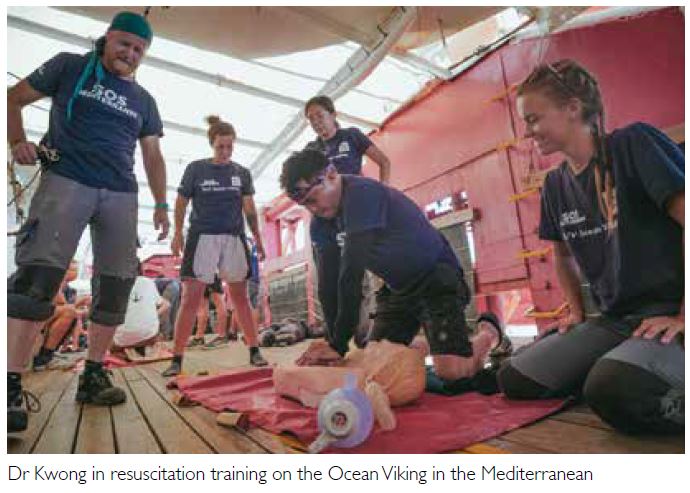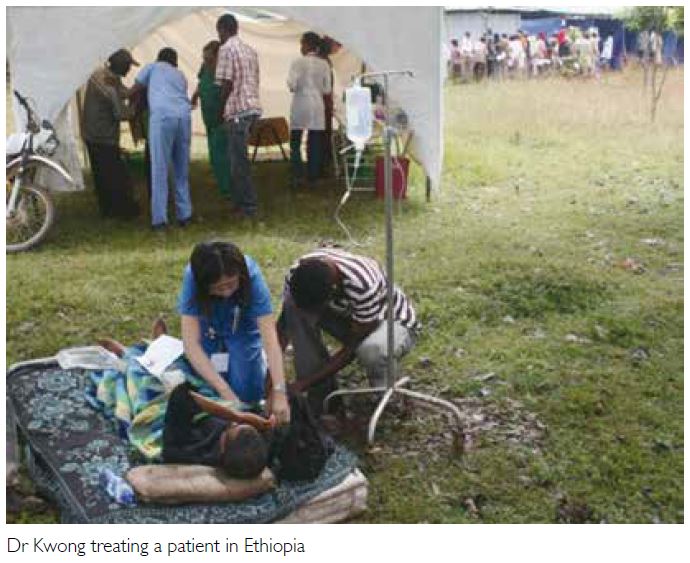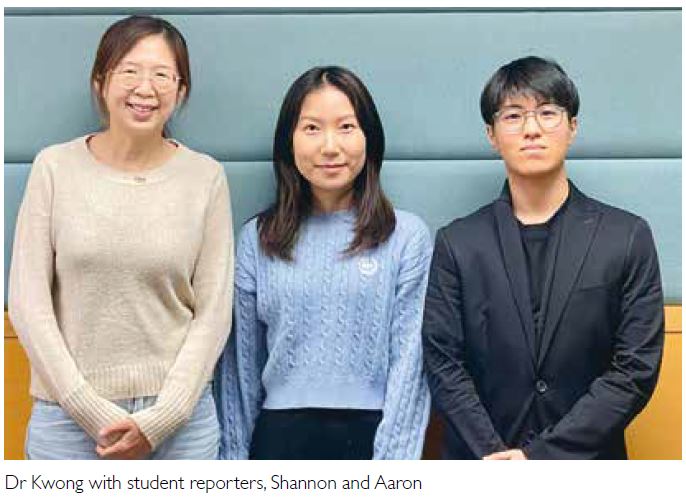© Hong Kong Academy of Medicine. CC BY-NC-ND 4.0
HEALTHCARE FOR SOCIETY
Healing and humanitarianism: an interview
with Dr Wing-yan Kwong
Shannon So1; Aaron Lau2
1 Year 4 MB, ChB, The Chinese University of Hong Kong, Hong Kong SAR, China
2 Year 1 MB, ChB, The Chinese University of Hong Kong, Hong Kong SAR, China
Dr Wing-yan Kwong is an emergency medicine specialist at the Queen Elizabeth Hospital. As a
recipient of the Hong Kong Humanity Award of the
Hong Kong Red Cross, she has served in developing
countries since medical school and has taken time
off work to join various overseas missions.
Having been an active volunteer at community
centres before university, Dr Kwong continued
her humanitarian work in Africa by taking a gap
year after completing her third year of medical
study in 2007. As a medical student, she focused
on providing health education and promotion in
African countries where poverty rates are high,
tropical diseases are widespread, and medical
professionals are in short supply. For instance,
she taught secondary school students about the
prevention of human immunodeficiency virus/acquired immunodeficiency syndrome. She also
worked for sponsorship programmes to raise money
to help impoverished children attend school.
These experiences strengthened Dr Kwong’s
determination to become a doctor so that she could
continue to serve communities in need outside of
Hong Kong. With this in mind, she chose to specialise
in emergency medicine as this would expose her to
a diverse patient population with a broad range of
health issues. In order to prepare herself for further
challenging missions, she temporarily quitted her
job to study tropical medicine at the University of
Liverpool in 2015.
Apart from deployment to Nepal after the
devastating earthquake in 2015 by the Hong Kong Red Cross, Dr Kwong also joined organised
programmes to provide primary healthcare in low-resource
countries such as Ethiopia and Zambia.
Most recently, she worked on a rescue ship called
Ocean Viking in the Mediterranean, which aims
to help save people fleeing their home countries to
Europe for a better life. These people are at risk of
drowning during the perilous journey in the sea.
Dr Kwong mentioned a number of difficulties she
encountered during her humanitarian services in
these places. One of the biggest problems was the
language barrier between her and her patients. Most
of the time, translators were unavailable, leaving
her to rely on body language for communication.
Another problem is related to limited resources.
Even when ultrasound machines were available, only
low-quality images can be produced; clinical skills
then become essential in this setting. When patients
in Hong Kong can be offered different drug choices,
patients in developing countries may only have a few.
Dr Kwong said that the medical team sometimes can
only educate their patients about simple manoeuvres
such as positioning or stretching to alleviate
symptoms, rather than relying on more technical
methods of diagnosis and treatment. Despite this,
the patients still appreciated their efforts.
In these resource-deprived communities, there
were also many physical challenges. For example,
during her service in Nepal, the temperature reached
45 degrees Celsius, and a few of her team members
suffered from heat stroke and dehydration, as there
was no air conditioning or enough electric fans for cooling. During the mission in Africa, Dr Kwong
was infected with malaria twice due to the lack of
mosquito preventive measures in some remote areas.
As for the Mediterranean mission, she mentioned
that many of her teammates, including herself,
suffered from seasickness when encountering high
waves at sea.
Dr Kwong had many memorable experiences
in her work. During the service in Nepal, she
encountered an old female patient with a dislocated
shoulder who had walked for more than a day to
receive treatment. By the time she arrived clinic,
her shoulder was very stiff and could not be reduced
without anaesthesia, which had to be performed
in the hospital. However, as the patient was the
mother of a big family, she needed to take care of
her family members and refused to be sent to the
hospital for further management. To Dr Kwong, it
was heart-wrenching to hear the patient decide to
live with a dislocated shoulder that could have been
cured. In her Mediterranean mission, she worked
with a rescue team to save refugees and bring them
to a safe port in Europe. Many refugees experienced
fuel burns, which are rarely seen in Hong Kong. The
commonly affected areas included the perineum
and legs due to their sitting positions. Women and
children were mostly affected as they were being
arranged in the boat’s centre where leaked fuel could
gather. The pain can be excruciating during wound
dressing or even toileting. Despite these depressing
moments, there were also many touching sights. In
Ethiopia, she witnessed a debilitated patient being
carried by a few of his neighbours on his mattress
to their mobile clinic—a testament to how close-knit
the neighbourhood was. Her most heart-warming
memory was of the villagers in Cameroon
who contributed the little money they had as her
transport fees after seeing her walking to the school
under the scorching sun every day.
Dr Kwong believes that the most positive
effect of her work was not seen in the patients she
treated by herself, but rather those treated by the
local medical professionals to whom she passed
on her skills and knowledge. In underdeveloped
areas, medical professionals may not have adequate
training in advanced or even basic cardiac life
support. While Dr Kwong may only be present for
several weeks to months in an area, communicating
and collaborating with local professionals has
ensured that local patients receive high-quality care
for years to come.
Though volunteering in such demanding
environments does carry an emotional toll, the
satisfaction Dr Kwong gets from her work is what
drives her to continue travelling long distances to
poverty-stricken places. Some may disagree with her
motives, citing the fact that Hong Kong already has
many patients in need, but having witnessed how much worse the situation is in the most neglected
countries, Dr Kwong considers it an honour to serve
them. Moreover, she does not believe that there is a
conflict between the two, as while she will certainly
devote a portion of her time to overseas patients, she
continues to serve mostly in Hong Kong.
With her busy work life in Hong Kong, Dr
Kwong admits that taking frequent leave to go
overseas in the future might be challenging. Still,
she intends to do so as much as possible, with the
support of her department. She would also like to
challenge herself by working in conflict areas and war zones, although she has some reservations after
seeing that hospitals have been targeted in the recent
war in Gaza. To any colleagues or students who
wish to follow her footsteps and begin volunteering
overseas, Dr Kwong cautions that there will be
definite limits on how much one may be able to help
these patients compared with medical practice at
home. However, instead of dwelling on this source
of frustration, Dr Kwong believes it is wiser to accept
it and try one’s best with the available resources. With
a little ingenuity and grit, anyone can contribute to
the vulnerable and underserved populations.





